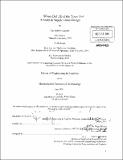Where did all of the totes go? : a study in supply chain design
Author(s)
Mulvey Connolly, Erin (Erin Helen); Keane, Emily
DownloadFull printable version (11.45Mb)
Alternative title
Study in supply chain design
Other Contributors
Massachusetts Institute of Technology. Engineering Systems Division.
Advisor
Edgar Blanco.
Terms of use
Metadata
Show full item recordAbstract
Corporations are increasingly looking at ways to incorporate environmental sustainability initiatives into their businesses to lower operating costs and improve the value of their brands for customers that expect higher social responsibility from corporations. These environmental initiatives, often called "win-win" for their dual effect on long-term shareholder value, are easy to identify but often hard to incorporate into existing operations. One such initiative in the retail industry involves delivering products to customers in reusable plastic cartons, rather than corrugated cardboard. One of the largest challenges when designing and implementing this type of supply chain system is developing a reverse logistics strategy that ensures carton return by the consumers, whom the corporation must convince to participate in closing the logistics loop. This thesis analyzes a pilot program conducted by a consumer products company, referred to as the Sponsor, where reusable plastic cartons were used to deliver orders to one of their corporate customers. Process mapping, qualitative interviews, and data analysis were utilized to understand factors contributing to the unacceptably high rate of carton attrition. Using the results of this analysis, two new design tracks are proposed for the delivery of the Sponsor's products at MIT. One design relies on the current operating systems and structures to minimize investment by the Sponsor, while the other design is aimed at maximizing effort to optimize the system. The proposed programs consider both operational practicalities in the logistical design and communication and incentive efforts that are needed to drive consumer behavior to maximize carton return and lower attrition rates. We believe the recommended implementation of the maximized effort design will result in lower carton attrition, which will provide the necessary proof of concept for the Sponsor to roll the program out to additional customers.
Description
Thesis (M. Eng. in Logistics)--Massachusetts Institute of Technology, Engineering Systems Division, 2011. Cataloged from PDF version of thesis. Includes bibliographical references (p. 82-83).
Date issued
2011Department
Massachusetts Institute of Technology. Engineering Systems DivisionPublisher
Massachusetts Institute of Technology
Keywords
Engineering Systems Division.